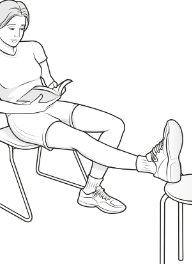Rehabilitation after total knee replacement involves restoring strength and range of motion in a limb that has been compromised and poorly mobile for some time, usually in a patient in the older age group.
Rehabilitation issues relating to knee replacement
Patients who have just had a knee replacement are often in a bad place when it comes to rehabilitation -
- they are likely to be elderly
- they are likely to have been relatively immobile for some time, with attendant muscle weakness and diminished bone strength
- they may have had some fixed flexion deformity before surgery
- pain and poor sleep may have been regular issues
After surgery there may, of course, be new problems -
- wound problems, including drains
- limb weakness from nerve blocks or spinal anaesthesia
- new post-operative pain
- tourniquet issues affecting nerves and muscles
- diminished position sense in the joint
Early rehabilitation after total knee replacement
In the first few days after knee replacement, rehabilitation focuses upon -
- preventing deep vein thrombosis
- improving quadriceps muscle strength
- regaining range of motion
Preventing deep vein thrombosis
Surgery combined with immobility, tourniquet trauma and bone cements puts knee replacement patients at risk of forming clots in their legs (deep vein thrombosis or DVT), which both compromises blood circulation and also may lead to the very dangerous complication of a clot shooting to the lung (pulmonary embolus.
Steps that may be put in place are both pharmacological and mechanical, and surgeons will differ in their protocols for preventing DVT -
- Patients may be temporarily put onto aspirin, heparin or other anticoagulants for the duration of the surgery and some days or weeks afterward.
- Compression devices may be applied by the staff to intermittently squeeze the foot and calf
- Foot pump exercises and heel slides may be encouraged while still in bed
- Early ambulation is important in getting the circulation going, using a mobility aid like a Zimmer frame
Improving quadriceps muscle strength
The quadriceps muscle that forms the lap is the main muscle that straightens the leg. Without a strong quads patients won't be able to get out of a chair or stand up straight, and stair climbing will be a major issue. Unfortunately, most knee replacement patients have weak quadriceps before they even have surgery, and the trauma of surgery can lead to an additional inhibition of the muscle.
Once the patient is home from hospital, the quadriceps can be strengthened in bed with short arc extension exercises and in a chair with full arc extension exercises.
Regaining range of motion
Both flexion and extension are likely to be compromised even before surgery, because pain may have been sufficiently severe to limit the range of motion and the joint capsule may have contracted to aggravate things further. Range of motion (ROM) exercises may include:
- Chair exercises to improve flexion and extension :

Use the good foot, with a shoe on, to slide the wheeled-chair back and forth, while keeping the bad foot on the ground. Alternatively, use an ordering dining room chair and put a towel under the bad foot, and slide it backwards and forwards.

Use a foot stool to support the heel on the operated side, and slowly let the weight of the leg perform a gentle but prolonged stretch.
Returning to full activities after total knee replacement
It is a sad fact that only about 25% of patients receive formal physiotherapy after leaving hospital. Even a year after surgery, patients may continue to demonstrate functional, strength and mobility deficits. They may need help with -
- ascending and descending stairs
- strengthening exercises
- proprioception exercises
- sports-specific exercises
Assessment of progress can include -
- Knee flexion and extension range
- Time to 'up-and-go' from a chair
- Time balancing on operated leg
- Ten-metre walk time
- Timed stair climbing